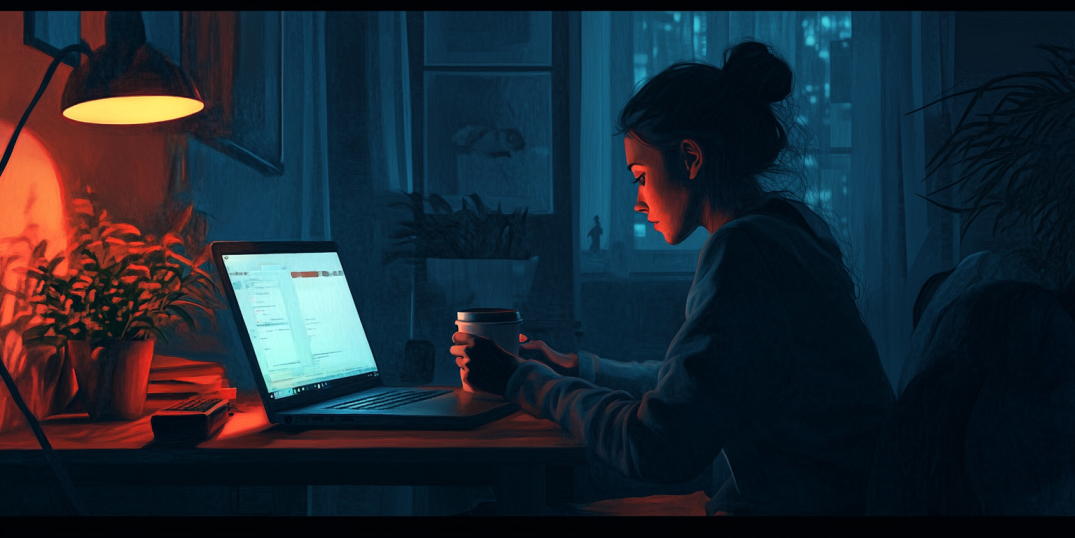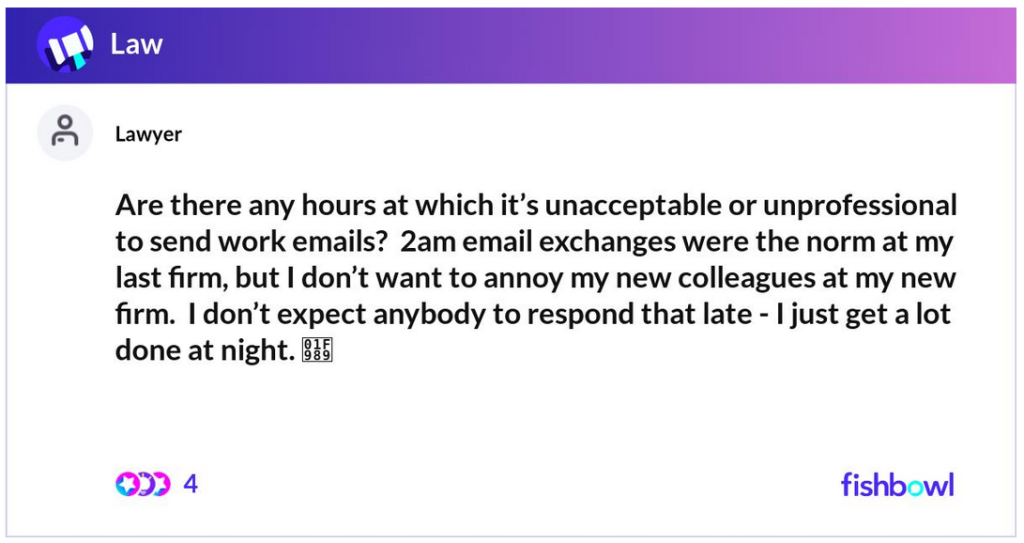- Home
- Friday Column
- Email Etiquette: 7 Myths about ...

🔍 How to start an email at night?
Use a polite, non-urgent tone, and consider scheduling your email delivery for morning.
🔍 Is it rude to send an email at night?
Not always. In some cases, context, tone, and recipient matter more than the timing.
🔍 When is it too late to send an email?
After 10 p.m. may feel too late unless it’s urgent or expected.
🔍 How to apologize for sending an email late at night?
Briefly acknowledge the timing and clarify that there is no need for a quick response.
🔍 Is it unprofessional to send an email late at night?
No, as long as it respects boundaries and doesn’t demand immediate action.
In recent years, the realities of working life have changed dramatically. With 58% of U.S. workers valuing flexible working hours, it’s no wonder that so many have shifted to fully remote or hybrid work settings. While this setup brings numerous advantages, it also comes with its controversies. As the boundaries between our professional and personal lives blur, so too does the understanding of workplace norms, including email etiquette.
This evolving landscape has sparked important questions: How do we maintain professionalism while adapting to these new working habits? And what role does late-night email etiquette play in fostering a healthy and productive work environment? In this article, we’ll explore these issues and debunk common myths about sending work emails at night.
Is It Unprofessional to Send Emails at Night?

The answer to this question: it depends. Some people think sending late-night emails is the worst sin ever in email etiquette, while others believe it’s just another way to stay on top of things in today’s 24/7 work culture.
If you’re firing off emails to a colleague at 2 a.m. expecting an immediate response, that might be less about being productive but more about getting a potential HR complaint. However, if you’re simply wrapping up your to-dos or sharing non-urgent updates, it’s probably fine.
The key to mastering late-night email etiquette is understanding your audience. If your recipient is someone who always checks emails the moment they land in their inbox, your 11 p.m. message could unintentionally stress them out. But if it’s a casual workplace where flexible hours are the norm, sending an email at night might not raise any concerns.
So, is it bad to send an email at night? Not inherently. Just don’t make it a habit unless it’s truly necessary. And if you’re worried about perception, use a “schedule send” button. In the end, as long as you stick to your deadlines, it really does not matter whether it is until 4 p.m. in the office or at midnight in your pajamas.
Arguments for Sending Emails at Night
The world doesn’t stop turning when the office lights are off. For some, sending the late-night emails is less about breaking email etiquette but more about maximizing productivity. Let’s explore why sending emails after hours might actually make sense.

- Flexible work hours, flexible inbox
In the era of hybrid and remote work, the traditional 9-to-5 has become more of a loose guideline than a strict rule. Nowadays, employees and employers alike are embracing schedules that fit their natural rhythms. So, a question like, “Is it bad to send an email at night?” might be somewhat outdated. It depends on the person and may simply align with when you are most productive.
- Global teams never sleep
With teams spread across different time zones, the “right time” to send an email doesn’t always exist. If your coworker in Paris is just starting their morning while you are wrapping up your evening in New York, why wait? When it comes to global collaboration, late-night email etiquette gets more forgiving.
- Clearing your mental inbox
Sometimes, the best way to end your day is by crossing every single thing from your to-do list. Sending emails at night can help you to breathe out and start fresh the next day. Scheduling the email for the next morning is another option, but sometimes you just need to press “Send” to feel that satisfying feeling of closure.
- Emergency situations happen
Life is unpredictable. Sometimes we all have last-minute project changes or an urgent update. So, sending a late-night email can be necessary to keep things on track. In these moments, is it unprofessional to email at night? Hardly. Rather, it is about setting the right priorities when it matters most.
- Setting the tone for tomorrow
For some people, sending emails at night is about setting the stage for the next day’s productivity. Sending an email before bed can ensure everything is prepared for morning action—just make sure you’re clear that no immediate response is needed, or you might end up stressing out your coworkers.
Arguments against Sending Emails at Night
While late-night emails might be efficient for some, they might not be seen as such by recipients or even your boss. While we assume that everyone has silent mode activated on all their devices, that is not always the case, and your late-night messages can stir up some complications. Let’s break down some of the opposing arguments.

- The perception problem
We are all different. While you may think you’re showing work dedication, your late-night email could come across as intrusive or even inappropriate. For some, after-hours emails scream “boundaries violation,” leaving them questioning your work-life balance—or worse, theirs.
- Accidental pressure to respond
Even if your intention is simply to clear your to-do list, late-night emails can unintentionally nudge others into responding right away. Not everyone has the willpower to see an email and leave it unanswered until morning. This can disrupt their personal time and create unnecessary stress.
- Sleep sabotage
Sending emails at night might clear your mental inbox while at the same time wreak havoc on someone else’s. Notifications can be annoying, but when you get them in the middle of the night, they are ten times more annoying. Even with “do not disturb” modes on, not everyone has their devices fully silenced at night.
- Risk of errors
Let’s be honest—late at night our brains do not work at their best. An after-hours email is more likely to contain typos, incoherent thoughts, or you might even accidentally press the “Reply All” button. Late-night emails might make you seem rushed or careless, which is the exact opposite of what you probably want.
- Blurred work-life boundaries
Sending emails at night can set a precedent that you’re always “on,” even outside regular hours. It’s a slippery slope that can lead to burnout—not just for you but for your team as well. If your coworkers or employees see you emailing after hours, they might feel obligated to do the same, perpetuating a toxic culture of overwork.
7 Myths about Sending Work Emails at Night
Myth 1: Late-night emails always signal overwork
It is easy to jump into the assumption that everyone who sends emails at midnight is drowning in work. Nonetheless, this is not always the case. Some people are simply night owls or working across time zones. Late-night emails might reflect personal productivity rhythms rather than an unhealthy workload. The real focus shall be not on the timing of emails but rather on ensuring these emails respect boundaries.
Myth 2: Sending emails at night is unprofessional
Not necessarily. Context is much more important. If you’re emailing at night to meet a deadline or accommodate international colleagues, it’s just practical and even ethical. The problem arises when nighttime emails disrupt others or suggest an expectation for immediate responses. That’s when email etiquette shall not be violated.
Myth 3: Night emails mean immediate action is required
Not every email sent after hours screams “urgent.” However, recipients often assume otherwise, which creates unnecessary stress. By clearly marking the urgency level (or lack thereof) in your email, you can eliminate confusion. If you consider sending a late-night email, be sure to make your intentions crystal clear.
Myth 4: Receiving emails at night encourages a toxic work culture
A work culture that demands 24/7 availability is definitely unhealthy. But not all-night emails imply that. If your company fosters clear boundaries—like no mandatory replies after certain hours—then late-night emails won’t necessarily contribute to toxicity. The real issue lies in the response culture, not the email invitation itself.
Myth 5: Night emails are always poorly thought out
Some argue that emails sent at night are rushed or impulsive, but this depends on the sender. Nighttime can actually be a quiet, distraction-free period, which makes it the perfect time for crafting thoughtful and detailed messages. However, proofread before sending shall be your mantra, no matter the hour.
Myth 6: Night emails are ineffective because no one reads them
The timing of email opens often depends on the recipient’s habits. While some people won’t check emails until morning, others might check their inbox late at night too. Otherwise, they’ll do it in the morning. Besides, tools like scheduled send ensure your email lands at the ideal time.
Myth 7: You should never send work emails at night
“Never” is a strong word. Sometimes sending a work email at night is unavoidable or simply practical, especially in international teams. As it was mentioned previously, the key here is not about the “to send or not to send” question, but rather about mastering email etiquette. If you understand when to use scheduling features, are mindful of tone, and avoid unnecessary urgency, there won’t be an issue with your emails, night or day.
3 Tips to Consider if You Are Sending Emails at Night
- Use scheduled send
Modern email platforms often come with a useful “schedule send” feature. It might be your best friend in maintaining late-night email etiquette. Rather than hitting “send” at midnight, schedule your email to arrive during regular working hours. Like this, you hit two birds with one stone: get the satisfaction of clearing your to-do list without disrupting someone else’s evening or sleep.
- Clearly mark urgent emails
If your email truly can’t wait until morning, you need to make clear why. Add a subject line like “Urgent” or “For Immediate Attention.” Like this, your recipient will know it’s a priority and not just you clearing out your inbox at odd hours. However, save this option for real emergencies. Overusing urgency in emails sent at night can diminish its effectiveness and make your coworkers roll their eyes every time they see your name pop up in their inbox.
- Set boundaries
Sometimes sending a late-night email is not an emergency but rather a habit. So, before you even consider starting to type that late-night email, ask yourself: Can it wait? If it happens frequently, you might need to reassess your work-life balance. More importantly, set expectations with your team or clients. Let them know they’re not required to respond outside of business hours. This way, even if you send an email late, it’s clear you’re not expecting a reply until morning.
To Sum Up
The days of fixed working hours are mostly gone, and so are the strict rules about multiple aspects of corporate culture. Working from home wearing your pajamas? Why not? Having a Zoom call while travelling? It happens. Sending an email to your colleagues in another time zone at 2 a.m. your time? Of course!
Since our working life becomes increasingly blended with our private lives, an understanding of what is appropriate and what is not now largely depends on a context. So, if you need to send a late-night email because it fits your natural schedule or because the project timeline requires it, it is perfectly fine to do so. What’s more important is to take into account some ethical considerations we’ve discussed in this article. Now, when you know all the specifics of late-night email etiquette, you can confidently navigate the nuances of after-hours communication without violating anyone’s sleep or inbox.

